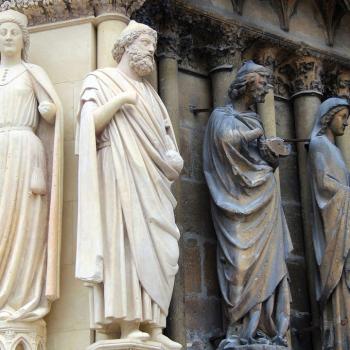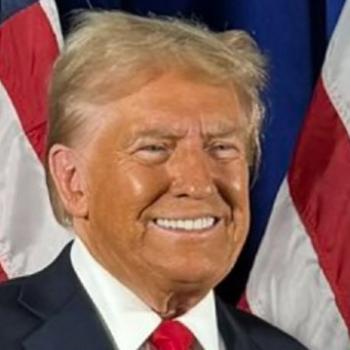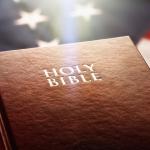There's speculation that former House Speaker Newt Gingrich is considering a run for president. Based on his recent speeches and interviews, though, it seems he has a different office in mind. Newt Gingrich wants to be pope.
Gingrich's latest slogan is a condemnation of "Obama's secular socialist machine."
The word "socialist" there is a deliberate lie. President Barack Obama is no socialist and Newt Gingrich knows this, but he is saying something he knows not to be true — bearing false witness — because he condescendingly believes it will appeal to ill-informed "base" (in every sense) voters who will, thanks to him, remain ill-informed. That's low and sleazy and evil, but it's not the worst part of his latest attack on the president.
The worst part is Gingrich's accurate accusation that President Obama is "secular."
He'd better be. As president, Barack Obama leads a secular government with secular policies. To do otherwise would be illegal. It would be unconstitutional and grounds for impeachment.
President Obama is himself a Christian and he often speaks openly and movingly about his faith. He even took the occasion of his Nobel speech to offer a lecture on theologian Reinhold Niebuhr.
But as president, Obama is sworn to uphold the Constitution and he does so. And that means he is and must be secular.
But Newt Gingrich thinks this is bad. Newt Gingrich thinks the American government ought to be sectarian.
This raises questions about how Gingrich proposes we go about rewriting America's laws and amending its Constitution to create this sectarian government. What will our new, rewritten First Amendment say? Once it establishes a religion and prescribes the proper exercise thereof, what sort of religious tests will it require of office holders?
As defender of the faith, what will be the new, sectarian president's official position on the Eucharist? On Baptism? Homoousia or homoiousia? Is glossalalia required or prohibited? What sort of head coverings will be required or prohibited in government offices? Will bishops be appointed by Rome or Canterbury? Or by the White House with Senate approval?
Or to summarize all of that and much, much, more into a single question: Which sect?
With Newt Gingrich standing before audiences and appearing on television to condemn America's secular Constitution and secular government, this is the only question anyone ought to be asking him. Audiences, interviewers, journalists, book editors, limo-drivers, waiters and bartenders need to be repeating this question to Gingrich, interrupting until he answers it.
And he has to answer it.
Which sect? If, like Gingrich, you oppose a secular Constitution and a secular government, then you must favor a sectarian Constitution and a sectarian government.
These are binary alternatives. Secular and sectarian are not points along a spectrum allowing for one to opt for some murky middle ground. There is no third way, no third option. If the government is not secular, the government must and will be sectarian.
Either the government will forbid the establishment of any official religious sect or an official religious sect will be established. Either the government will refuse to interfere with the free exercise of any religion or it will necessarily involve itself in the exercise of all of them.
Newt Gingrich is unambiguously in favor of establishing an official sect. So, then, which one?
Note that this question demands a scrupulously specific and particular answer. It doesn't allow for some vague blather about our "Judeo-Christian heritage." That's not a sect. No one belongs to a local Judeo-Christian congregation.
Nor will it suffice to say that "America is a Christian nation." That's still far too broad — Orthodox? Roman Catholic? Protestant? And any of those answers is still too broad for the practical sectarian governance championed by Newt Gingrich. Presbyterian? Lutheran? Baptist? Still far too broad.
The official sect of any nonsecular government must be intensely specific. That sect, after all, will be privileged above all the others and so it must be clearly distinguished from those others. (These others needn't be wholly prohibited. They can be tolerated as religious minorities provided they keep their place and do not seek more than this second-class toleration.) Office-holders and appointed officials must be members in good standing of the official sect, and therefore a strict definition of correct and incorrect doctrine will be needed to clarify the status of these true believers. That will require sectarian officials who can inquire about that status to ensure its legitimacy, and that inquiry or inquisition cannot be so broad as to allow pretenders or disingenuous infidels to pass themselves off as law-abiding, loyal members of the official religion.
So again, which sect, Newt?
Gingrich himself is a convert to Roman Catholicism (the religion of his third wife). This does not necessarily mean that his advocacy of sectarian government implies a belief that Roman Catholicism ought to become the official, established sect written into America's Constitution. It may be, rather, that Gingrich wants to see some other sect codified as the legal religion of America's government and that he would gladly abandon his own religious beliefs to adopt this new official sect as his own, whatever it may be. But either way he has to answer the question.
Which sect?
















